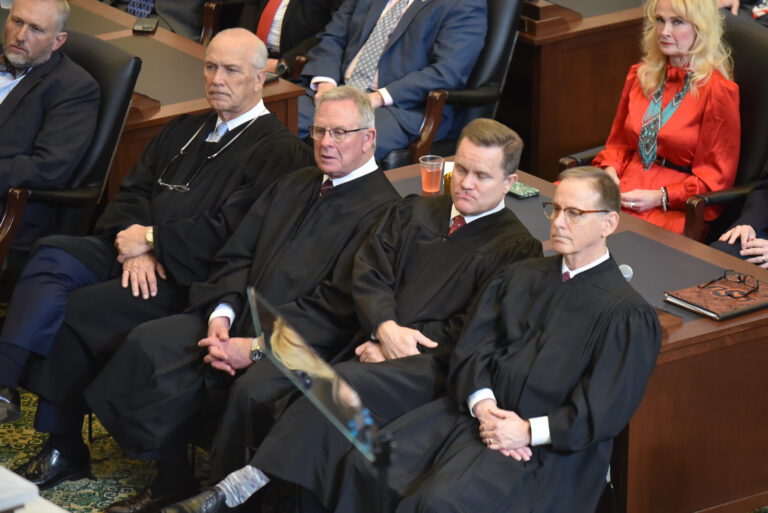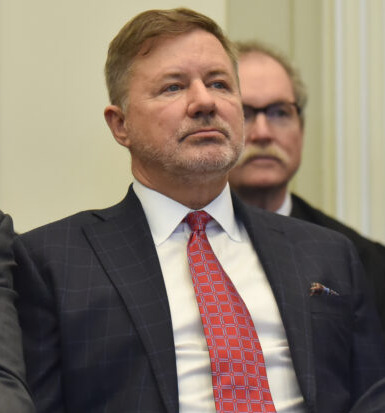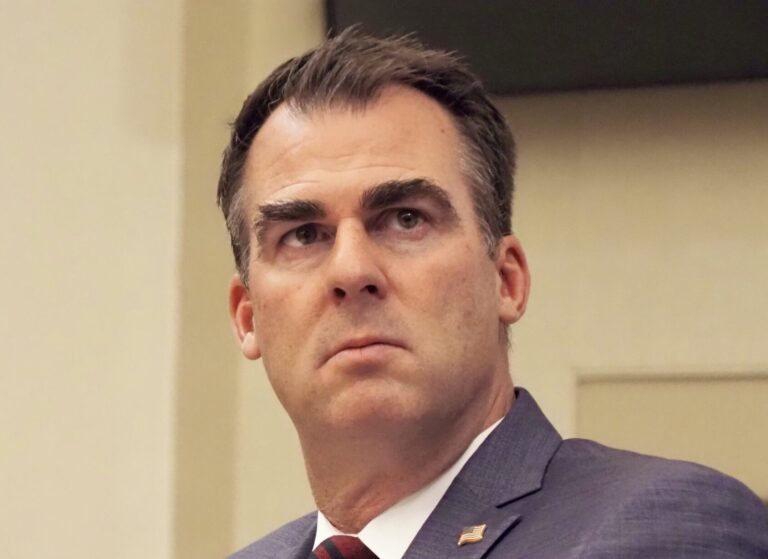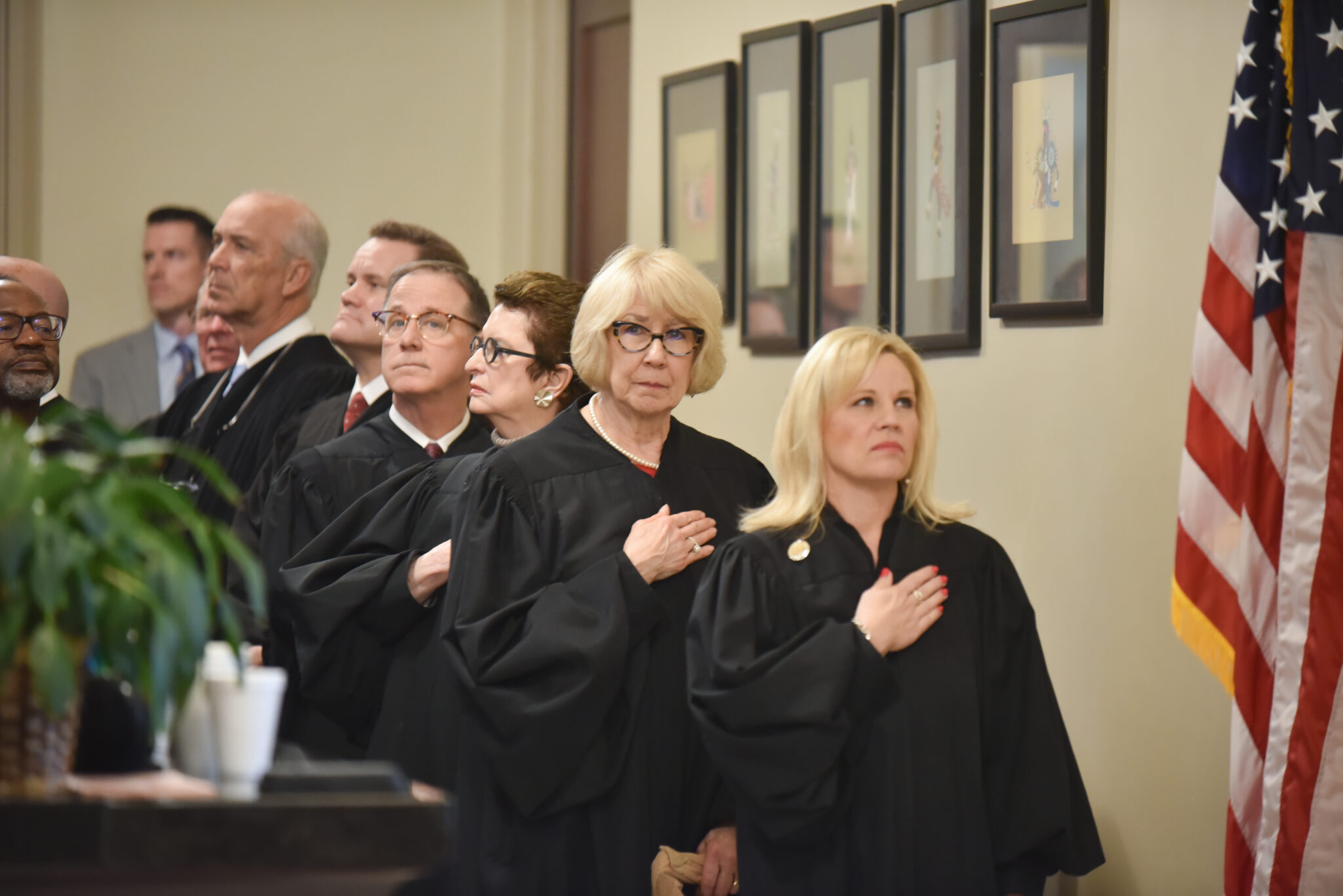This story was originally published by The Oklahoma Voice.
OKLAHOMA CITY — The Oklahoma Supreme Court has rejected the existence of a publicly funded Catholic charter school in the state.
In a majority opinion issued Tuesday, six of the state’s nine justices agreed with Attorney General Gentner Drummond that the contract creating St. Isidore of Seville Catholic Charter School must be rescinded.
The ruling blocks St. Isidore from opening for its inaugural school year, which was only weeks away with more than 200 students applying to enroll. Catholic leaders say they will explore “all legal options” moving forward.
St. Isidore, a virtual charter school, would teach Catholic doctrine and require attendance at mass. The state funding such a school would violate both the Oklahoma and U.S. Constitution’s prohibition against government-established religion, the majority of the Court decided.

Kyle Phillips/For Oklahoma Voice
From right, Oklahoma Supreme Court Chief Justice John Kane IV, Vice Chief Justice Dustin P. Rowe, Justice James R. Winchester and Justice Douglas L. Combs attend the the governor’s State of the State Address at the state Capitol on Feb. 5.
Justice James R. Winchester wrote the opinion and borrowed some of the attorney general’s language —
that permitting a state-funded religious school would create a “slippery slope.”
That slippery slope would lead toward “the destruction of Oklahomans’ freedom to practice religion without governmental interference,” Winchester wrote.
Justices Yvonne Kauger, James E. Edmondson, Douglas L. Combs, Noma Gurich and Richard Darby agreed. Chief Justice John Kane IV recused.
Vice Chief Justice Dustin P. Rowe agreed only that the state Constitution requires charter schools to be non-religious but disagreed with the rest of the majority’s opinion.
Justice Dana Kuehn dissented to the entire opinion. She said the decision is “destined for the same fate” as other rulings, later overturned by the U.S. Supreme Court, against allowing private religious schools to receive public funds.
“Contracting with a private entity that has religious affiliations, by itself, does not establish a state religion, nor does it favor one religion over another,” Kuehn wrote.

Kyle Phillips/For Oklahoma Voice
Attorney General Gentner Drummond, left, said the creation of a Catholic charter school would present a threat to religious liberty.
Drummond called the ruling a “tremendous victory for religious liberty.”
“The framers of the U.S. Constitution and those who drafted Oklahoma’s Constitution clearly understood how best to protect religious freedom: by preventing the State from sponsoring any religion at all,” he said in a statement.
The Archdiocese of Oklahoma City and the Diocese of Tulsa created the school and received approval last year from the Oklahoma Statewide Virtual Charter School Board for St. Isidore to open as a state-funded entity.
Archbishop Paul Coakley and Bishop David Konderla said the ruling is “very disappointing for the hundreds of prospective students and their families from across the state of Oklahoma who desired the educational experience and promise of St. Isidore of Seville Catholic Virtual School.”
“We will consider all legal options and remain steadfast in our belief that St. Isidore would have and could still be a valuable asset to students, regardless of socioeconomic, race or faith backgrounds,” Coakley and Konderla said.
The attorney general filed a lawsuit against the school and the Statewide Virtual Charter School Board, asking the Supreme Court to intervene. He presented oral arguments to the Court on April 2.
Drummond contended the school plainly violates state laws that prohibit publicly funded schools from adopting a religion.
He said allowing a school like St. Isidore would open the door for state-funded schools to teach other religious beliefs, such as Sharia law or Satanism.
“While I understand that the Governor and other politicians are disappointed with this outcome, I hope that the people of Oklahoma can rejoice that they will not be compelled to fund radical religious schools that violate their faith,” Drummond said.

Nuria Martinez Keel/Oklahoma Voice
Gov. Kevin Stitt has been a vocal advocate of opening St. Isidore of Seville Catholic Virtual School, a state-funded Catholic charter school.
Gov. Kevin Stitt and state Superintendent Ryan Walters were vocal advocates of the Catholic charter school as a way to grow education options for families.
Stitt said he hopes the U.S. Supreme Court will review the case and reverse the ruling.
“I’m concerned we’ve sent a troubling message that religious groups are second-class participants in our education system,” the governor said in a statement. “Charter schools are incredibly popular in Oklahoma – and all we’re saying is: we can’t choose who gets state dollars based on a private entity’s religious status.”
Archdiocese officials said St. Isidore would be open to students of all faiths or no faith, but it would be an environment that is Catholic in all ways. By their own description,
the school would be a “genuine instrument of the church” and would take part in the Catholic Church’s evangelizing mission.
Opening St. Isidore as a free, virtual school would allow the church to educate students in all parts of the state, especially in areas where no Catholic school exists, archdiocese officials said.
Attorneys representing the school and the Statewide Virtual Charter School Board contended charter schools are private entities and are free to adopt a religion, unlike public schools. Charter schools are governed by a non-profit board subject to state oversight and are granted more freedom to decide their teaching methods.
The Court rejected the notion that charter schools are anything but public.
Charter schools rely on state funds to operate, and Oklahoma law defines public schools as “all free schools supported by public taxation.”
Although they’re allowed more flexibility, charter schools must comply with all laws “in the same manner as a school district,” according to state law.
“The Legislature created Oklahoma charter schools, and Oklahoma law treats them as public schools and governmental bodies,” Winchester wrote. “… They are creatures of state law and may only operate under the authority graduated to them by their charters with the state. St. Isidore will be acting as a surrogate of the state in providing free public education as any other state-sponsored charter school.”
St. Isidore also meets the criteria of a “state actor” under at least two tests the U.S. Supreme Court created to determine whether an entity is acting as an arm of the government. The justices found it meets the “entwinement” test which questions whether the entity is entwined with government policies or whether the government is involved in the entity’s management or control.
The school also meets the “public function” test because St. Isidore will provide free public education, a responsibility the Oklahoma Constitution has decided exclusively belongs to the state, according to the opinion.
The justices found St. Isidore also violates the First Amendment of the U.S. Constitution, which prohibits the government from establishing a religion.
“St. Isidore’s educational philosophy is to establish and operate the school as a Catholic school,” Winchester wrote. “Under both state and federal law, the state is not authorized to establish or fund St. Isidore.”
A separate lawsuit against the school is pending in Oklahoma County District Court. A coalition of Oklahoma parents, faith leaders and education advocates were the first to sue the school, contending it would discriminate against LGBTQ+ students and employees, fail to adequately serve children with disabilities and unlawfully indoctrinate into a religion.
They are represented by a team of attorneys from Americans United for Separation of Church and State, the American Civil Liberties Union, the Education Law Center and the Freedom from Religion Foundation, along with local counsel.
That case is scheduled for a three-day hearing in late July over whether St. Isidore should be eligible to open and receive state funds. The impact the Supreme Court’s ruling will have on that lawsuit is unclear.
The legal organizations celebrated the Court’s decision on Tuesday, calling it a safeguard for public education and the separation of religion and government.
“Charter schools are public schools that must be secular and serve all students,” they wrote in a statement. “St. Isidore of Seville Catholic Virtual School, which plans to discriminate against students, families, and staff and indoctrinate students into one religion, cannot operate as a public charter school.”
***
Nuria Martinez-Keel covers education for Oklahoma Voice. She worked in newspapers for six years, more than four of which she spent at The Oklahoman covering education and courts.
Oklahoma Voice is part of States Newsroom, a nonprofit news network supported by grants and a coalition of donors as a 501c(3) public charity. Oklahoma Voice maintains editorial independence.


























